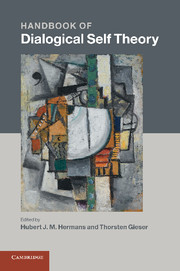Book contents
- Handbook of Dialogical Self Theory
- Handbook of Dialogical Self Theory
- Copyright page
- Contents
- Figures
- Tables
- Contributors
- Epigraph
- Introductory chapter
- Part I Theoretical contributions
- Part II Methods for studying the dialogical self
- Part III Domains of application
- 19 The use ofI-positions in psychotherapy
- 20 Dialogically oriented therapies and the role of poor metacognition in personality disorders
- 21 Reconstructing the self in the wake of loss: a dialogical contribution
- 22 Creating dialogical space in psychotherapy: meaning-generating chronotope ofma
- 23 Therapeutic applications of dialogues in dialogical action therapy
- 24 The depositioning of theI: emotional coaching in the context of transcendental awareness
- 25 The dialogical self and educational research: a fruitful relationship
- 26 The self in career learning: an evolving dialogue
- 27 Navigating inconsistent consumption preferences at multiple levels of the dialogical self
- Epilogue
- Index
25 - The dialogical self and educational research: a fruitful relationship
from Part III - Domains of application
Published online by Cambridge University Press: 05 June 2012
- Handbook of Dialogical Self Theory
- Handbook of Dialogical Self Theory
- Copyright page
- Contents
- Figures
- Tables
- Contributors
- Epigraph
- Introductory chapter
- Part I Theoretical contributions
- Part II Methods for studying the dialogical self
- Part III Domains of application
- 19 The use ofI-positions in psychotherapy
- 20 Dialogically oriented therapies and the role of poor metacognition in personality disorders
- 21 Reconstructing the self in the wake of loss: a dialogical contribution
- 22 Creating dialogical space in psychotherapy: meaning-generating chronotope ofma
- 23 Therapeutic applications of dialogues in dialogical action therapy
- 24 The depositioning of theI: emotional coaching in the context of transcendental awareness
- 25 The dialogical self and educational research: a fruitful relationship
- 26 The self in career learning: an evolving dialogue
- 27 Navigating inconsistent consumption preferences at multiple levels of the dialogical self
- Epilogue
- Index
Summary
Keywords
Information
- Type
- Chapter
- Information
- Handbook of Dialogical Self Theory , pp. 439 - 453Publisher: Cambridge University PressPrint publication year: 2011
Accessibility standard: Unknown
Why this information is here
This section outlines the accessibility features of this content - including support for screen readers, full keyboard navigation and high-contrast display options. This may not be relevant for you.Accessibility Information
- 7
- Cited by
